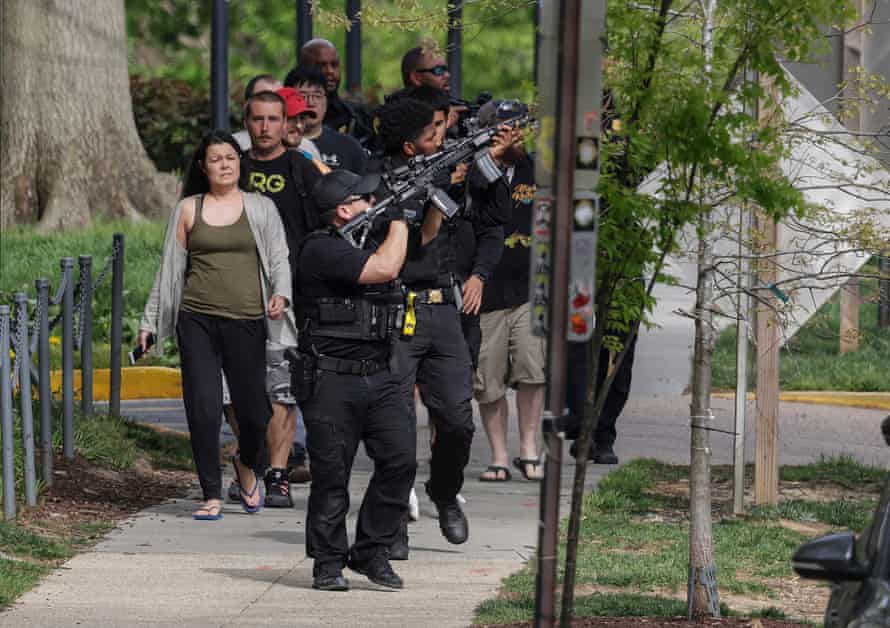‘Cheering section’ for violence: the attacks that show 4chan is still a threat
When police in Washington DC burst into a fifth-floor apartment building on 22 April in search of a man who allegedly had shot four people at random, they found Raymond Spencer dead by his own hand, a cache of guns and ammunition, and a poster with an ironic white supremacist meme.
The poster invoking the meme, popular on the extremist online forum 4chan, was a stark reminder that this attack blamed on Spencer, 23, was only the most recent mass casualty attack to spawn out of the ugly extremist culture of unregulated internet message boards such as 4chan.
That particular forum gave birth to QAnon, the far-right conspiracy theory that Donald Trump is combating a cabal of leftist pedophiles, before it moved on to its even-more-extreme cousin 8chan. QAnon has been particularly effective in crafting the lie that the 2020 presidential election was stolen from Trump, inspiring the Capitol riot on 6 January 2021. A bipartisan Senate committee connected seven deaths to the attack.
Alek Minassian, 25, posted an update on Facebook with a direct reference to 4chan and its extreme misogynistic community of so-called incels, short for involuntary celibates, before launching a deadly vehicle ramming rampage in Toronto in 2018. And after New Zealand police arrested Brenton Tarrant, who shot and killed 51 worshippers in mosques in Christchurch, he cited 4chan and 8chan as direct influences.
Seemingly by sheer luck, Spencer’s recent attack in Washington was less costly in terms of lives. But it was still a stark reminder of how many online extremists and the movements with which they sympathize can trace their origins to either 4chan or 8chan, said Oren Segal, vice-president of the Anti-Defamation League’s Center on Extremism.
“The chans – 4chan, 8chan, etc – are some of the most vile places on the internet,” Segal told the Guardian. The trolling, humor, appeals to violence: it “seeps outside the confines of the message boards,” he added.
Spencer’s case has chilling aspects. He fired 200 rounds from a makeshift sniper’s nest, injuring a man, two women, and a 12-year-old girl. He had an additional 800 rounds stashed.
Just two minutes after the shooting began, someone under the username “Raymond Spencer” logged onto the normally-anonymous 4chan and started a new thread titled “shool [sic] shooting”. The newly published message contained a link – to a 30-second video of images captured from the digital scope of Spencer’s rifle. The clip streamed images and sounds of the barrage of bullets which slammed into cars and shattered windows at an adjacent school while also maiming four strangers.

Even as police stormed the apartment building where Spencer hid, with officers maneuvering past a surveillance camera that he had set up in the hallway and was monitoring, Spencer continued to post to the message board.
“They’re in the wrong part of the building right now searching,” he posted at one point. A few minutes later: “Waiting for police to catch up with me.”
As he waited, Spencer logged on to Wikipedia to edit the entry for Edmund Burke School, which he had just opened fire on.
“A basedman shot at the school on April 22, 2022,” the edit read, using a message board term derived from the word “based,” which is 4chan slang for somebody who agrees to the board’s warped worldview. “The suspect is still at large.”
Police believe Spencer shot himself to death as officers breached his apartment.
Like those who have carried out other domestic terror attacks that rocked the US, Canada and New Zealand in recent years, Spencer situated his mass shooting in a tangle of ironic memes and 4chan in-jokes.
On a poster hanging in the apartment where Spencer died was a cartoon of a Black man with an enlarged head. It’s a deeply ironic reference to Nation of Islam theology – which holds that a Black scientist named Yakub created the white race more than 6,000 years ago. 4chan co-opted the concept more recently, caricaturing it along the way, to justify its own white supremacist philosophy.
Anti-extremist groups such as the Southern Poverty Law Center have warned for years that 4chan and 8chan would continue inspiring domestic terror attacks. Cassie Miller, a researcher at the center, analyzed a self-selected survey of users to a white supremacist webforum. She found nearly 25% reported that they considered themselves radicalized – or, in their terms, “redpilled” – by the culture of 4chan and 8chan.
It was tied for the single most-reported pathway to radicalization.
While the far-right online ecosystem has grown significantly since then, the edgy humor and racist politics of ‘chan’ culture continue to prove influential, especially among younger users.
The chans “normalize the kinds of narratives and grievances that are dangerous”, Segal said. They form a sort of “cheering section” for violence.
Even 8chan’s founder, Frederick Brennan, has blamed the site for a rise in mass shootings and unsuccessfully called for it to be shut down.
Brennan quit the site in 2016, leaving management to its new owners: Jim Watkins and his son Ron. The pair, who have since been identified as the likely puppet masters behind QAnon, have rejected more active moderation and have leveraged the site’s extreme free speech ethos for their own political ends – Ron Watkins is currently running in a Republican congressional primary in Arizona.
There are few good solutions on how to address the radicalizing influence of these forums, Segal said. Owners like Watkins have been unwilling to crack down on hate speech; whenever one web hosting company has removed them, another has stepped up; and law enforcement is simply ill-suited to monitor and investigate the deluge of hate on the platforms.
It will take a “whole-of-society approach”, Segal said. “Everything that normalizes hateful ideology … needs to be addressed.”

